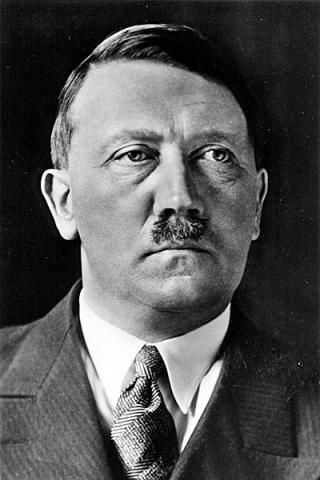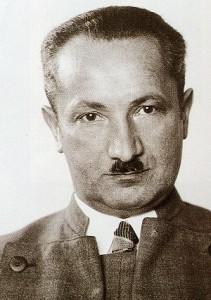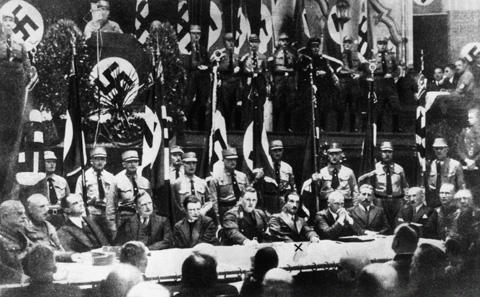
By Carolyn Yeager
The 125th anniversary of Hitler's birth on April 20th coincides with the publication of the “antisemitic” notebooks of German philosopher Martin Heidegger, arguably the most influential European philosopher of the 20th century (only Ludwig Wittgenstein rivals him for the title), according to this article.
There are other connections between the two. They were born in the same year, 1889. Heidegger joined Hitler's National-Socialist party, the NSDAP, in 1933 when Hitler became Chancellor and he remained a member until 1945. He served as rector of Freiburg University in Baden-Württemberg for one year, from 1933 to 1934. He praised the "inner truth and greatness" of National-Socialism during a lecture in 1935. Never once did Heidegger express a word of moral condemnation of the Nazis or the "Holocaust."
On the other hand, there is said to be no evidence that Heidegger accepted National-Socialist racial theories, but that doesn't absolve him because the notebooks contain passages denouncing "world Jewry," the distinctively Jewish "talent for calculation," and the "collusion of 'rootless' Jews in both international capitalism and communism."
And this from a man who is considered one of the greatest minds of his generation! Certainly not to be tolerated by the establishment. I will give a more detailed review of these passages at the end of this article. But to put first things first, I must now give my birthday tribute to Adolf Hitler.
* * *
One of his deepest friendships was with Winifred Wagner, the English-born daughter-in-law of Richard Wagner, the great composer. A famous comment from Winifred was that after the war it was frowned upon to mention Adolf Hitler's name - and so they spoke in code: USA = unser seeliger Adolf - our blessed Adolf.
True and great heroes come only rarely. In Adolf Hitler, we had the greatest Aryan leader of … well, okay, I'll qualify it … modern times. Hitler was not only a true and great leader, but also a unique type of personality. That he had a Catholic upbringing and influences rather than Protestant is an important key to understanding him. Generalizing, Catholics have a more generous spirit than Protestants: they overlook more faults in others and don't insist that their way must be right, while yet still remaining faithful to it. [During Hitler's time, the gulf between Protestant and Catholic was larger and more meaningful than it is today.]
Adolf Hitler's ideas and personality were (and are) so compelling that he drew to his movement men and women of high quality and commitment, inspiring their deep loyalty. In our difficult times today, which appear to us as no more dangerous than theirs appeared to them, we can find in Adolf Hitler our own inspiration for carrying on the tasks that we must. For this reason I find it distressing when he is misused, not only by those on the opposite side of the political and social spectrum, but by those on our side as well. To put it more clearly, not only by those who denigrate and demonize him, but by those who claim to be admirers and advocates. So many of these latter come up with their own version of what Hitler stood for.
Among these non-Hitler-approved versions are Esoteric Hitlerism, in which Hitler becomes semi-divine and is associated with whatever religious ideas the proponent himself has; the Black Sun and Hyperborean myths; the underground UFO bases around the world supposedly created by National-Socialists and their scientists. From all this comes the idea that National-Socialism is a spiritual, and even occult concept rather than racial; that whoever demonstrates certain qualities, variously identified as Loyalty, Honor, Cleanliness, Reverence, Pride, Patrotism, Bravery is a National-Socialist. Some will even say these traits are what National-Socialism consists of. Therefore, N-S is taken out of it's German framework and becomes available for everyone according to their own interpretation - even non-Whites if they care to claim it for themselves.
I say to these people, get your own name, get your own icons and images. Don't take Adolf Hitler's name and use it to help sell some other product of your own devising. This tendency should be rebuked by every real National-Socialist.
I'd like to point out that what is called Nazism is not Hitler. To understand National-Socialism one must learn about Adolf Hitler, the living man, the person. Genuine N-S does not exist independently of him and his words.
* * *
Now I'll go to a more complete description of Martin Heidegger and his scandalous “black notebooks.”
 Born in the same year as Adolf Hitler – 1889 – he is one of Europe's most influential 20th Century scholars. It is said he has inspired many of the other important scholars of the modern era. And now the publication in March of his so-called “Black Notebooks” (philosophical workbook/diaries with black covers containing his reflections from 1939 to 1941) has revealed a more marked agreement with National-Socialist ideology than previously known. Case in point, he is critical of Weltjudentum (world Judaism), calling it one of the main drivers of western modernity (of which he was critical). [Note in picture at right that Heidegger is wearing a folkish German suit. He often wore such national clothing, as did many others.]
Born in the same year as Adolf Hitler – 1889 – he is one of Europe's most influential 20th Century scholars. It is said he has inspired many of the other important scholars of the modern era. And now the publication in March of his so-called “Black Notebooks” (philosophical workbook/diaries with black covers containing his reflections from 1939 to 1941) has revealed a more marked agreement with National-Socialist ideology than previously known. Case in point, he is critical of Weltjudentum (world Judaism), calling it one of the main drivers of western modernity (of which he was critical). [Note in picture at right that Heidegger is wearing a folkish German suit. He often wore such national clothing, as did many others.]
"World Judaism," Heidegger wrote then, "is ungraspable everywhere and doesn't need to get involved in military action while continuing to unfurl its influence, whereas we are left to sacrifice the best blood of the best of our people."
The philosopher also wrote of the Jewish people's "talent for calculation"; he pointed out their loud opposition to the Nazi's racial theories was because "they themselves have lived according to the race principle for longest." Heidegger even appears to adopt some of the central themes of the Protocols of the Elders of Zion with his notion of “world Judaism,” of which Adolf Hitler had approved in a short passage in Mein Kampf.
The notebooks' editor, Peter Trawny, says that Heidegger failed to “immunise his thinking” from antisemitic ideas. In the notebooks, the philosopher's “antisemitism” mixes with a strong resentment of American and English culture, driving what he called Machenschaft, variously translated as "machination" or "manipulative domination". Heidegger sees fascism and world judaism, Soviet communism and British parliamentarianism as part of the imperious dehumanising drive of western modernity: "The bourgeois-Christian form of English 'bolshevism' is the most dangerous. Without its destruction, the modern era will remain intact." And "What, other than engineering and metaphysically paving the way for socialism, other than commonplace thinking and tastelessness, has England contributed in terms of 'culture'?"

Heidegger is marked by an X, shown participating in a meeting, as Rector of Freiburg University, of a National-Socialist German Science organization on November 11, 1933 in Liepzig.
The Philosopher's Legacy
The director of the Martin Heidegger Institute has said he was "shocked" when he discovered the antisemitic passages a year and a half ago, but decided to go ahead with their publication in spite of the potential damage they could cause to the philosopher's legacy. "I still think you can engage with Heidegger constructively," he said. Which is another way of saying that Heidegger is 'damaged goods' but we cannot throw him out entirely without lessening the field of philosophy. The director/editor's shock is in discovering how closely related the world famous philosopher is to Adolf Hitler in their antisemitism.
Other philosophers have argued that the new revelations do not amount to a "smoking gun" of antisemitism, and should not lead to a dismissal of Heidegger's other writings even if they did. “Philosophy is about learning to be aware of problems in your own thinking where you might not have suspected them," said the British philosopher Jonathan Rée about the black notebooks. In other words, Heidegger can teach us, perhaps, how to identify lurking “antisemitism” in our own thought processes and totally eradicate it! We wouldn't want to get caught thinking like him, would we?
There are those on both sides of the Big Question: How related is Heidegger's antisemitism to his philosophy as a whole? In France, where Heidegger has been mostly favored, some philosophers dismiss such an idea.
But Florian Grosser, a Heidegger expert in the philosophy department of the University of St. Gallen, in Switzerland says, "We regularly see terms in Heidegger’s work like das Volk, ‘homelessness,’ ‘uprootedness,’ and ‘worldlessness,’" Such terms, he notes, were the standard vocabulary of Europe’s anti-Semitic right, regularly applied to Jews. But in Heidegger’s published work, "it’s not Jews he’s talking about, but rather the fate of modern man. So, if indeed he goes further in the notebooks, Mr. Grosser says, "we’re going to have to look at exactly how he connects these concepts to Jews. It could be very problematic."
The “problem” for the philo-semitic academics is whether Heidegger really shared a mindset with Adolf Hitler about Jews. Previously he was portrayed as an “opportunist” who joined the Nazi party out of convenience for his career's sake (which is strangely seen as acceptable), not as someone who participated out of genuine idealistic conviction. The latter is what is not acceptable!
For myself, I am cheered by the content of the Black Notebooks, and consider their publication at this time as a lovely birthday present for Der Führer on the milestone 125th anniversary of his blessed birth. Blessed, but not divine! In the code language of Winifred Wagner and her friends: Happy Birthday, USA.